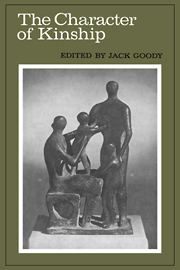Book contents
- Frontmatter
- Contents
- Dedication
- Introduction
- KINSHIP AND DESCENT
- THE NATURE OF KINSHIP
- Genetrix: Genitor:: Nature: Culture?
- The Long Term and the Short Term: the Economic and Political Significance of the Morality of Kinship
- The Kith and the Kin
- THE NATURE OF THE FAMILY
- MARRIAGE AND AFFINAL ROLES
- Bibliography of the Writings of Meyer Fortes
- References
- Index
Genetrix: Genitor:: Nature: Culture?
Published online by Cambridge University Press: 07 May 2010
- Frontmatter
- Contents
- Dedication
- Introduction
- KINSHIP AND DESCENT
- THE NATURE OF KINSHIP
- Genetrix: Genitor:: Nature: Culture?
- The Long Term and the Short Term: the Economic and Political Significance of the Morality of Kinship
- The Kith and the Kin
- THE NATURE OF THE FAMILY
- MARRIAGE AND AFFINAL ROLES
- Bibliography of the Writings of Meyer Fortes
- References
- Index
Summary
We salute Meyer Fortes for his achievements not only in the intensive investigation of the Tallensi and Ashanti of Ghana but also in the comparative analysis of diverse social and cultural systems, notably in his Lewis Henry Morgan lectures published as Kinship and the Social Order (1969). Although he has long remained a steadfast defender of the strategy of concentrating anthropological field resources on the study of peoples whose material artefacts are simple (Fortes 1958 a), he has always been sensitive to the light these studies shed on patterns of living found in industrial societies. It is therefore appropriate in the present context to discuss some of the issues that arise in kinship studies when we endeavour to compare social and cultural patterns in many different societies including our own. My thesis is that this comparison suggests a reformulation of the relation between kinship and nature. I focus on putative physical relations rather than on relations of social parenthood.
It can be argued that in anthropology and sociology comparative analysis is impossible without including, either explicitly or by implication, the society to which the analyst himself belongs and the culture whose concepts and categories he uses to think with. This view has been expressed by Schneider (1972: 47–8) who, in recent years, has appealed forcefully for the study of kinship as part of a cultural or symbolic system and who has provided the most uncompromising account of such a system in the Western tradition.
- Type
- Chapter
- Information
- The Character of Kinship , pp. 61 - 74Publisher: Cambridge University PressPrint publication year: 1974
- 4
- Cited by



